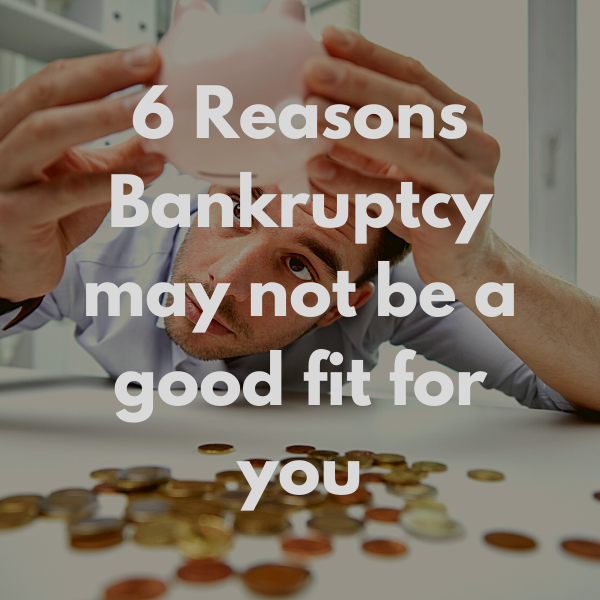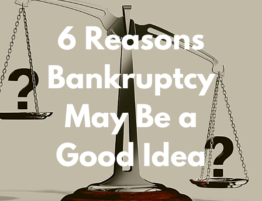
Given the current ongoing pandemic, many businesses have shut down which has led to the unemployment of millions of people. The government stimulus checks were able to help citizens with some of their bills but not all; and since there are no current plans for another stimulus check, many individuals are overwhelmed and drowning in debt. With the end of the pandemic nowhere in sight, people with outstanding debts are wondering what to do to make ends meet. This article focuses on 6 reasons bankruptcy may not be a good fit for you.
Filing for bankruptcy is one of the many options available to you since bankruptcy erases peoples’ debt. While there are many types of bankruptcies that a person can file for, the main two bankruptcies that people usually apply for are chapter 7 and 13. To help with the filing process, people consult bankruptcy attorneys to ensure that they are making the right choice for themselves, their finances and all parties involved. If you are wondering whether bankruptcy is the right fit for you, you have come to the right place. After reading this article, it is still advised to consult with a bankruptcy attorney as they can often see things that we do no since they do this for a living.
One of many things that people fail to do when they are considering filing for bankruptcy is learn more about what bankruptcy is and what the whole process entails, which is why people often overlook its usefulness when dealing with debts. Though bankruptcy is often a great option for some individuals, it is not a great option for all and there are different qualifications and requirements that an individual needs to meet to not only file a claim but also get approved. If you do not meet the qualifications and requirements, then filing for bankruptcy is not a good option for you and you should look for other debt management options with the help of a bankruptcy attorney.
Below are some of the reasons an individual is not a good fit for bankruptcy.
1. Your debts are not outstanding
One of the many reasons people file for bankruptcy is because their debts are outstanding and they have no way of paying them back at least for a great amount of the foreseeable future. Right now given the covid-19 pandemic, a lot of people are jobless and feel as though their debts are outstanding especially since there is no predicted end for the pandemic. This will lead a lot of people to make bankruptcy claims and some people will get denied because their debts are not outstanding according to the courts.
Bankruptcy is a last resort for individuals who have an overwhelming amount of debt. An overwhelming debt amount may indicate that bankruptcy is proper option. But if you do not feel this way, then bankruptcy is probably a good fit for you. Though bankruptcy may not be a good fit for you, there are options that are more beneficial for you and your financial future if you consult with a bankruptcy attorney. A bankruptcy attorney is often used during the bankruptcy process but they can also be useful to you once you start considering bankruptcy. They help you look at different options and understand which one will be the most helpful to you when it comes to managing your debts and lightening the load.
2. Your income is too high to pass the Means Test
To assist the courts with determining who to approve for bankruptcy, there are certain requirements that individuals need to meet. One of these requirements is that you need to make the average income for your household. If you make more than the average then your chances of getting approved for bankruptcy should you choose to file are not high. The average income varies by state, so you can look up the numbers for your state online. A bankruptcy attorney can also help you with this. A bankruptcy attorney near you or in your area will know the average income for your household size and where you fall.
Should you happen to make more than the average, a bankruptcy attorney will also know whether what you currently make will be a deterrent in your case. Though typically, people who make over the average amount do not qualify for bankruptcy, certain courts may consider other factors when evaluating your case and your bankruptcy attorney will be able to let you know if that is the case, whether you meet those factors, and if those will be sufficient. If you make more than average, and there are no other factors to consider, then bankruptcy is more than likely not a good choice for you and your bankruptcy attorney will be able to highlight other options that will be good for you to consider.
3. You have too many valuable assets

Some assets that usually have high monetary value include jewelry and furniture, especially if they are don’t depreciate in value. Others include stocks or other real property, especially in metropolitan areas. Selling these items for sizable amounts will enable a debtor to pay off certain debts. Thus, if you have valuable items you can sell and pay off your debts, consider avoiding bankruptcy.
If you do not know how much your assets are worth and would like to know, then you should consult with a bankruptcy attorney. When you make a bankruptcy claim they will go through all your finances and see what should be used to pay off your debts, so it is best to meet with a bankruptcy attorney so they can let you know whether your assets will be a problem for you should you decide to make the bankruptcy claim. If you do have a lot of valuable assets, then filing for bankruptcy may not the best option for you. The likelihood of a trustee selling off these assets to pay your debts increases.
4. You are not comfortable with the entire process
Filing for bankruptcy is very tedious and stressful. So it is best to know what you are in for before continuing with the process. Different people will tell you different things about the filing process, and while some are true, the only people who will have full and accurate knowledge about the bankruptcy filing process is a bankruptcy attorney. Many bankruptcy attorneys have seen their clients through the bankruptcy process and have acquired many tips that they can pass on to you to make your process easier.
Some things you should know when it comes to filing for bankruptcy are; the bankruptcy notation on your credit report for a maximum of ten years. Two mandatory credit counselling courses, one taken prior to filing for bankruptcy and one taken after. These credit counselling courses educate you on debt management and other things to expect when you file for bankruptcy. After learning more about what the entire bankruptcy process looks, you may have doubts about whether to continue or not. If these doubts are very strong, then filing for bankruptcy may not be a good choice for you.
5. Bankruptcy will not discharge most of your debts
The main reason people file for bankruptcy is to have most of their debts discharged. Debtors don’t want to worry about repaying overbearing debts, especially during the COVID-19 pandemic. With respect to Chapter 7 bankruptcy, only certain unsecured debts receive a discharge. Unsecured debts carry no attachments to things that can be sold or exchanged for the loan forgiveness or reduction. Types of unsecured debts are medical bills and utility bills, and these are not representative of all unsecured debts.
A bankruptcy attorney will be able to tell you whether the majority of your debts fall under the unsecured or secured category. Moreover, there are different types of bankruptcies you can file for. The most common ones are chapter 7 and chapter 13, so consulting with a bankruptcy attorney will help you decide which type is better for you.
Reconsider filing for bankruptcy if most of your debts won’t be discharged by bankruptcy. Explore other bankruptcy alternatives instead. Locating alternatives to bankruptcy can prove difficult since helpful information tends to be buried in the internet. Consulting with a bankruptcy attorney will enhance the options available. Remember that debt management can greatly improve your financial life and mental wellbeing.
6. Your bankruptcy attorney tells you so

Your bankruptcy attorney may show and make available a number of different options (i.e., bankruptcy, debt negotiation, debt dispute). Debtors will find some options more suitable than others depending on various circumstances (ie, debt amount, monthly income). Consider the advice of your bankruptcy attorney once he/she presents these various debt relief options.
Most debtors find a bankruptcy discharge immensely appealing, a contributing factor to the large amount of filers; nevertheless, the negative effect on one’s credit report is a glaring downsides to filing for bankruptcy. Filing Chapter 7 or Chapter 13 bankruptcy comes at the cost of hurting your credit. A bankruptcy serves as a big deterrent when you apply for anything requiring good credit. If you require good credit credit in the upcoming years, many bankruptcy attorneys will not advise you file for bankruptcy. If alternatives exists to managing one’s debt, thoroughly consider those options before smearing your credit report with a bankruptcy filing.
Bankruptcy is a good option for some people with an overwhelming amount of debts. However, the aftermath of filing for bankruptcy (i.e., Chapter 7) does not always carry good effects. If there an alternate manner of resolving one’s debts exist effectively, heavily consider such alternative.
The need for a bankruptcy attorney
Consider the different categories mentioned above if you have a desire to file for bankruptcy. Do not allow them to discourage you from continuing with your filing. Instead, allow them to fully inform you about the steps to take and what to expect when filing for bankruptcy. This article attempts to cover the important things you need to know; however, make note of the aforementioned and permit an experienced bankruptcy attorney to detail the particulars.
Many of us want to be self sufficient and find all the information we need to know via the internet. We often prefer to conduct our own legal research. Still, the information found online does not eliminate the need for a bankruptcy lawyer. “Allow your own research to simply supplement the information provided,” asserts San Diego bankruptcy attorney Tristan Brown. Before debt obligations worsen and get out of hand, make an appointment and consult with an bankruptcy attorney in your area. A simple search of “bankruptcy attorney near me” should suffice.
Bankruptcy attorneys can also help with debt management by providing you with tools and referrals that will be useful to your situation. Everyone’s debt issues differ, so not everyone will fall under the aforementioned categories and check the same boxes. Such nuance furthers the need for a bankruptcy attorney to review your case individually.



